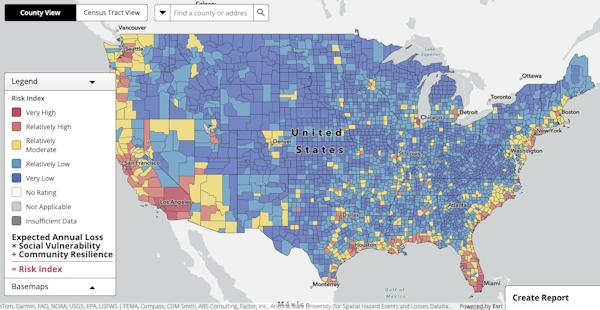SEJournal Online is the digital news magazine of the Society of Environmental Journalists. Learn more about SEJournal Online, including submission, subscription and advertising information.
 |
 |
| A map of the National Risk Index from the Federal Emergency Management Agency is one of the sources where reporters and others can get more information about risks in their own area. Graphic: FEMA. |
Reporter’s Toolbox: Climate Risk Data Helps Decisions, Stories About Looming Disaster
By Joseph A. Davis
It’s getting harder to say they didn’t warn you: It’s now possible to look up some eye-opening climate risks on real estate all over the United States. Before you buy.
For exemplary data journalism on the topic, check out a piece published last fall by a large team at The Washington Post. Except it’s not exactly data. Rather it’s a blend of projections, models and graphics based on data.
The other important thing is that it explores a collection of climate-related risks: coastal flooding, inland flooding, hurricanes, heat, drought and wildfire. That’s just for starters if you are looking at climate risks. But it’s more than enough.
It’s the lookup-ability that
makes it useful for environmental
journalists who want to do their
own local or regional stories.
In any case, it’s the lookup-ability that makes it useful for environmental journalists who want to do their own local or regional stories.
Where the data comes from
The “data” underlying this investigation comes from a variety of sources. One of them is AlphaGeo, a climate modeling group that provided county-level data for the Post’s lookup tool. Another is First Street, a real estate-focused climate risk-modeling firm.
It turns out that some nationwide real estate firms are starting to offer this kind of information. They include Redfin, Realtor.com, ClimateCheck and Zillow.
Very helpful is the article's list of sources where people can get more info about risks in their own area. It includes:
- National Risk Index from the Federal Emergency Management Agency
- Wildfire Risk to Communities from the National Forest Service
- Sea Level Rise Viewer from the National Oceanic and Atmospheric Administration
- Flooding Days Projection Tool from the National Aeronautics and Space Administration
Using the data smartly
First off, don’t get distracted by the Post’s focus on Florida — unless you are thinking of buying real estate there. In which case you should pay attention and consider not buying it.
Second, you may find that the Post’s only lookup tool is too blunt for many purposes because it only gets you down to the county level. That is too bad because at least some more granular and finer geographic resolution data is available. (We know because the article tells us so.)
Some of the bulleted sources above may get to an even more localized data source.
One nice thing about the Post piece is that it includes a list of real estate risk-disclosure laws in each state. Look yours up. Ask if it protects potential buyers.
Another thing to remember is the geographic specificity of risks. If you are writing about Arizona, you may not worry about hurricane risks. SEJournal has listed many other real estate environmental risks here.
As always, remember that data stories depend on reporting the human and nondata aspects of the story. Groundtruth everything.
[Editor’s Note: See our related Issue Backgrounder on the coming climate disaster insurance meltdown.]
Joseph A. Davis is a freelance writer/editor in Washington, D.C. who has been writing about the environment since 1976. He writes SEJournal Online's TipSheet, Reporter's Toolbox and Issue Backgrounder, and curates SEJ's weekday news headlines service EJToday and @EJTodayNews. Davis also directs SEJ's Freedom of Information Project and writes the WatchDog opinion column.
* From the weekly news magazine SEJournal Online, Vol. 10, No. 7. Content from each new issue of SEJournal Online is available to the public via the SEJournal Online main page. Subscribe to the e-newsletter here. And see past issues of the SEJournal archived here.












 Advertisement
Advertisement 



